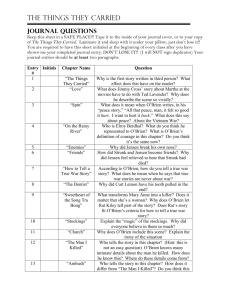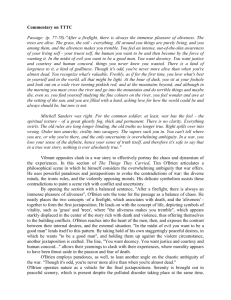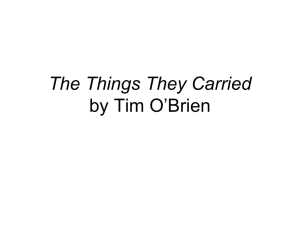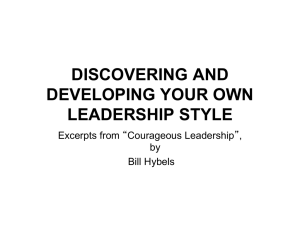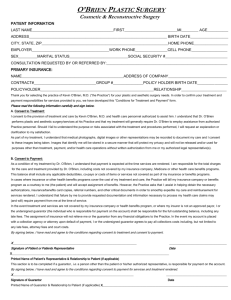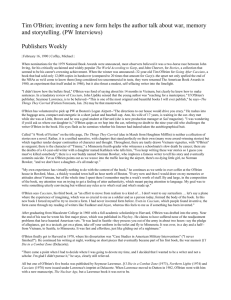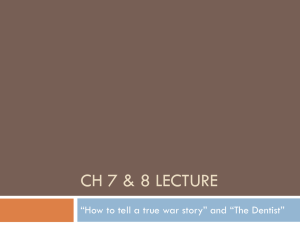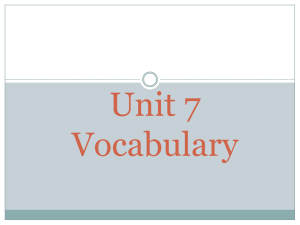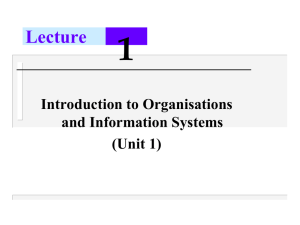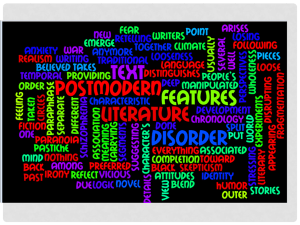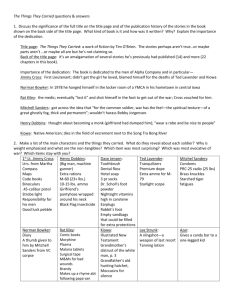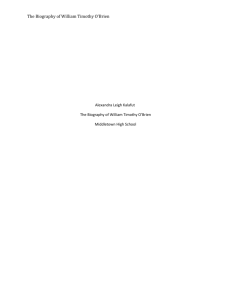Theme Development Essay Assignment & Example
advertisement
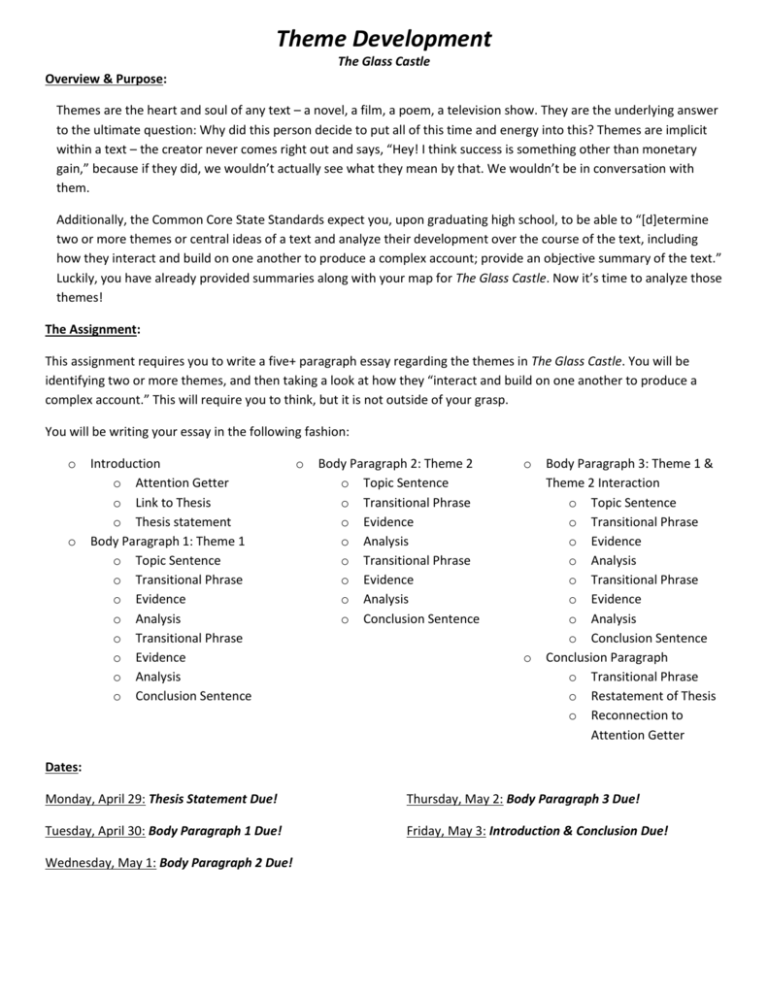
Theme Development The Glass Castle Overview & Purpose: Themes are the heart and soul of any text – a novel, a film, a poem, a television show. They are the underlying answer to the ultimate question: Why did this person decide to put all of this time and energy into this? Themes are implicit within a text – the creator never comes right out and says, “Hey! I think success is something other than monetary gain,” because if they did, we wouldn’t actually see what they mean by that. We wouldn’t be in conversation with them. Additionally, the Common Core State Standards expect you, upon graduating high school, to be able to “[d]etermine two or more themes or central ideas of a text and analyze their development over the course of the text, including how they interact and build on one another to produce a complex account; provide an objective summary of the text.” Luckily, you have already provided summaries along with your map for The Glass Castle. Now it’s time to analyze those themes! The Assignment: This assignment requires you to write a five+ paragraph essay regarding the themes in The Glass Castle. You will be identifying two or more themes, and then taking a look at how they “interact and build on one another to produce a complex account.” This will require you to think, but it is not outside of your grasp. You will be writing your essay in the following fashion: o o Introduction o Attention Getter o Link to Thesis o Thesis statement Body Paragraph 1: Theme 1 o Topic Sentence o Transitional Phrase o Evidence o Analysis o Transitional Phrase o Evidence o Analysis o Conclusion Sentence o Body Paragraph 2: Theme 2 o Topic Sentence o Transitional Phrase o Evidence o Analysis o Transitional Phrase o Evidence o Analysis o Conclusion Sentence o o Body Paragraph 3: Theme 1 & Theme 2 Interaction o Topic Sentence o Transitional Phrase o Evidence o Analysis o Transitional Phrase o Evidence o Analysis o Conclusion Sentence Conclusion Paragraph o Transitional Phrase o Restatement of Thesis o Reconnection to Attention Getter Dates: Monday, April 29: Thesis Statement Due! Thursday, May 2: Body Paragraph 3 Due! Tuesday, April 30: Body Paragraph 1 Due! Friday, May 3: Introduction & Conclusion Due! Wednesday, May 1: Body Paragraph 2 Due! Examples for Themes Essay Example Thesis Statement for The Glass Castle: Jeanette Walls’ novel, The Glass Castle, develops a unique perspective on success in a nation obsessed with monetary gains; through the development of two themes – lost dreams and perseverance – Walls conjures a contrarian image of success in America. Example Essay Based on The Things They Carried Memories haunt us. Memories make us who we are. Too often, we forget what we wish to remember, and we remember what we wish to forget. Too often, we run, scared, from the memories that plague us. For veterans, memories often lead them to divorce, homelessness, and suicide. For Tim O’Brien, Vietnam War veteran, writing has made the remembering livable. Tim O’Brien’s novel, The Things They Carried, stands as one of America’s most wellreceived portrayals of the Vietnam War; through O’Brien’s development of two themes – courageousness and recollection – he depicts the true emotional toll war has on the psyche. In The Things They Carried, Tim O’Brien divulges the truth about courage. The first mention of courage in O’Brien’s novel appears on pages 20 and 21, in the chapter “The Things They Carried.” O’Brien avers, They carried their reputations. They carried the soldier’s greatest fear, which was the fear of blushing. Men killed, and died, because they were embarrassed not to. It was what had brought them to the war in the first place, nothing positive, no dreams of glory or honor, just to avoid the blush of dishonor. They died so as not to die of embarrassment… It was not courage, exactly; the object was not valor. Rather, they were too frightened to be cowards. As O’Brien avows, courage stands in direct opposition to cowardice. Many, particularly Americans, believe that military service it the penultimate expression of courage; to them, courage is fighting and dying. According to O’Brien, courage is doing what one believe is right. In accordance with this belief, O’Brien plainly states, “I was a coward. I went to war” (58). With this assertion, O’Brien clearly states that he believes he was a coward and so were many of his fellow soldiers. Ultimately, The Things They Carried stands as a testament to not only the physical, quantifiable atrocities of war, but also the emotional and psychological devastation of young men, boys really, too afraid to be called cowards. According to O’Brien, courage is the ability to follow the path one sees as most virtuous, not to do what one is told to do. The Things They Carried is a living museum of O’Brien’s emotional experiences during the Vietnam War. Throughout the novel, O’Brien utilizes the art of storytelling to recapture the essence of Vietnam. Though his tales within the novel are not “happening-truth”, they are an accurate depiction of what it felt like to be a soldier. O’Brien expresses this sentiment in the chapter, “Good Form”: “I want you to feel what I felt. I want you to know why story-truth is truer sometimes than happening-truth” (171). This manner of recalling the past brings great insight into the true, personal memory of war. “[W]hen you go to tell about it, there is always that surreal seemingness, which makes the story seem untrue, but which in fact represents the hard and exact truth as it seemed” (68). Through O’Brien’s depiction of memory, it is clear to his audience that memory is not a textbook; memory is rife with emotion, and that emotion has a much more profound impact on one’s memories than the memories alone. The interaction of courage and memory in The Things They Carried creates a complex account of the emotional impact war has on soldiers. Remembering and retelling the most traumatic events of one’s past is a courageous act. For many, recalling is a form of reliving, reassessing, and reopening wounds. Though, as evidenced above, O’Brien often depicts himself as a moral coward, his bravery in remembering and recounting his traumatic experiences as a soldier is a form of courage. This idea can be glimpsed in O’Brien’s meta-writing about “Speaking of Courage” in the chapter “Notes”. “[S]omething about the story had frightened me – I was afraid to speak directly, afraid to remember – and in the end the piece had been ruined by a failure to tell the full and precise truth about our night in the shit field” (153). For many, the fear of remembering is one of humanities greatest personal cowardices. Often, individuals bury trauma beneath thin layers of resentment and, ultimately, time. As the axiom goes, “Time heals all wounds.” Unfortunately, this is not true. Those wounds rarely have the chance to heal, and they become infections of the mind and soul. This is made clear by O’Brien in his explanation of Norman Bowker’s unfortunate suicide. O’Brien states, “I did not look on my work as therapy, and still don't. yet when I received Norman Bowker's letter, it occurred to me that the act of writing had led me through a swirl of memories that might otherwise have ended in paralysis or worse” (152). The ability to reevaluate, relive, and reconsider one’s most disturbing memories is an act of courage most cannot sew onto their mind’s regalia. Ultimately, The Things They Carried is Tim O’Brien’s revisiting of some of the most emotionally scarring events in his life. Through his development of two themes – courageousness and recollection – the true heroism in telling a tough story is distinguished. The courage to remember puts the terrors of memories to rest.
